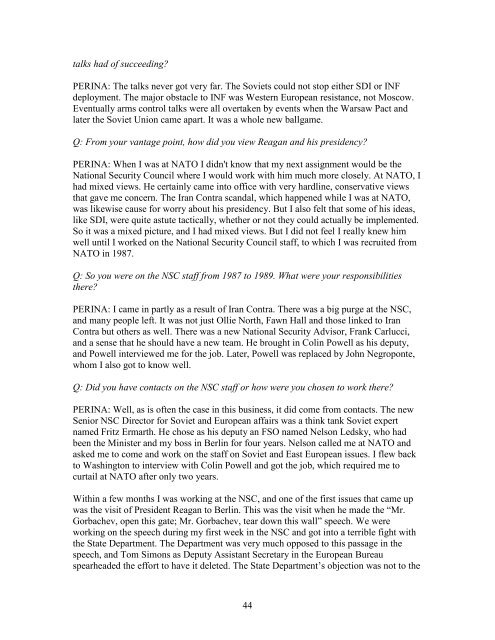ambassador rudolf v. perina - Association for Diplomatic Studies and ...
ambassador rudolf v. perina - Association for Diplomatic Studies and ...
ambassador rudolf v. perina - Association for Diplomatic Studies and ...
Create successful ePaper yourself
Turn your PDF publications into a flip-book with our unique Google optimized e-Paper software.
talks had of succeeding?<br />
PERINA: The talks never got very far. The Soviets could not stop either SDI or INF<br />
deployment. The major obstacle to INF was Western European resistance, not Moscow.<br />
Eventually arms control talks were all overtaken by events when the Warsaw Pact <strong>and</strong><br />
later the Soviet Union came apart. It was a whole new ballgame.<br />
Q: From your vantage point, how did you view Reagan <strong>and</strong> his presidency?<br />
PERINA: When I was at NATO I didn't know that my next assignment would be the<br />
National Security Council where I would work with him much more closely. At NATO, I<br />
had mixed views. He certainly came into office with very hardline, conservative views<br />
that gave me concern. The Iran Contra sc<strong>and</strong>al, which happened while I was at NATO,<br />
was likewise cause <strong>for</strong> worry about his presidency. But I also felt that some of his ideas,<br />
like SDI, were quite astute tactically, whether or not they could actually be implemented.<br />
So it was a mixed picture, <strong>and</strong> I had mixed views. But I did not feel I really knew him<br />
well until I worked on the National Security Council staff, to which I was recruited from<br />
NATO in 1987.<br />
Q: So you were on the NSC staff from 1987 to 1989. What were your responsibilities<br />
there?<br />
PERINA: I came in partly as a result of Iran Contra. There was a big purge at the NSC,<br />
<strong>and</strong> many people left. It was not just Ollie North, Fawn Hall <strong>and</strong> those linked to Iran<br />
Contra but others as well. There was a new National Security Advisor, Frank Carlucci,<br />
<strong>and</strong> a sense that he should have a new team. He brought in Colin Powell as his deputy,<br />
<strong>and</strong> Powell interviewed me <strong>for</strong> the job. Later, Powell was replaced by John Negroponte,<br />
whom I also got to know well.<br />
Q: Did you have contacts on the NSC staff or how were you chosen to work there?<br />
PERINA: Well, as is often the case in this business, it did come from contacts. The new<br />
Senior NSC Director <strong>for</strong> Soviet <strong>and</strong> European affairs was a think tank Soviet expert<br />
named Fritz Ermarth. He chose as his deputy an FSO named Nelson Ledsky, who had<br />
been the Minister <strong>and</strong> my boss in Berlin <strong>for</strong> four years. Nelson called me at NATO <strong>and</strong><br />
asked me to come <strong>and</strong> work on the staff on Soviet <strong>and</strong> East European issues. I flew back<br />
to Washington to interview with Colin Powell <strong>and</strong> got the job, which required me to<br />
curtail at NATO after only two years.<br />
Within a few months I was working at the NSC, <strong>and</strong> one of the first issues that came up<br />
was the visit of President Reagan to Berlin. This was the visit when he made the “Mr.<br />
Gorbachev, open this gate; Mr. Gorbachev, tear down this wall” speech. We were<br />
working on the speech during my first week in the NSC <strong>and</strong> got into a terrible fight with<br />
the State Department. The Department was very much opposed to this passage in the<br />
speech, <strong>and</strong> Tom Simons as Deputy Assistant Secretary in the European Bureau<br />
spearheaded the ef<strong>for</strong>t to have it deleted. The State Department’s objection was not to the<br />
44
















